 Petzlover
Petzlover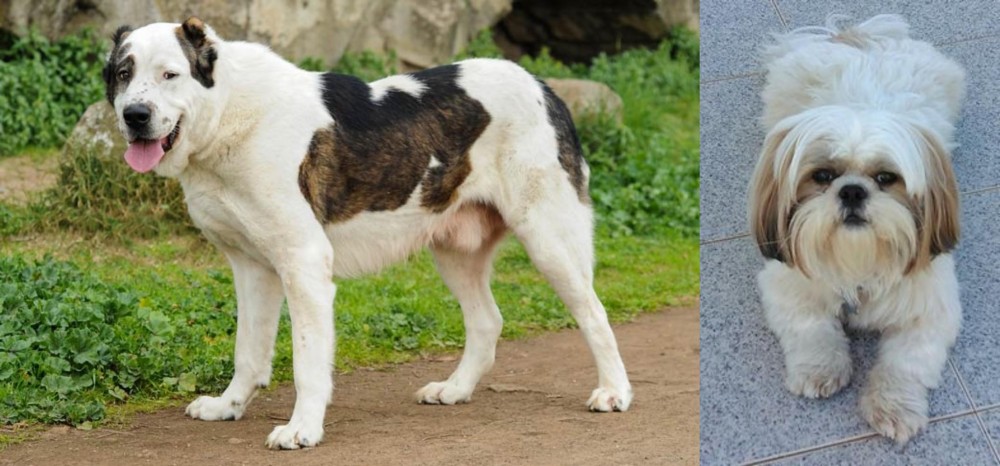 Central Asian Shepherd is originated from Russia but Shih Tzu is originated from China. Central Asian Shepherd may grow 42 cm / 17 inches higher than Shih Tzu. Central Asian Shepherd may weigh 43 kg / 95 pounds more than Shih Tzu. Central Asian Shepherd may live 3 years less than Shih Tzu. Both Central Asian Shepherd and Shih Tzu has almost same litter size. Central Asian Shepherd requires Moderate Maintenance. But Shih Tzu requires High Maintenance
Central Asian Shepherd is originated from Russia but Shih Tzu is originated from China. Central Asian Shepherd may grow 42 cm / 17 inches higher than Shih Tzu. Central Asian Shepherd may weigh 43 kg / 95 pounds more than Shih Tzu. Central Asian Shepherd may live 3 years less than Shih Tzu. Both Central Asian Shepherd and Shih Tzu has almost same litter size. Central Asian Shepherd requires Moderate Maintenance. But Shih Tzu requires High Maintenance
 This large dog breed is a native to the wilds of Central Asia, where it has been guarding and protecting livestock for thousands of years. In fact the Central Asian Shepherd is one of the oldest dog breeds of the world.
This large dog breed is a native to the wilds of Central Asia, where it has been guarding and protecting livestock for thousands of years. In fact the Central Asian Shepherd is one of the oldest dog breeds of the world.
Early records as to the precise origin of the breed aren’t available. There are suggestions that the breed descended from ancient Middle Eastern livestock guarding breeds, while the other suggests the dog is descended from the Tibetan Mastiff. It is almost certain that the dog was domesticated from the Wolf.
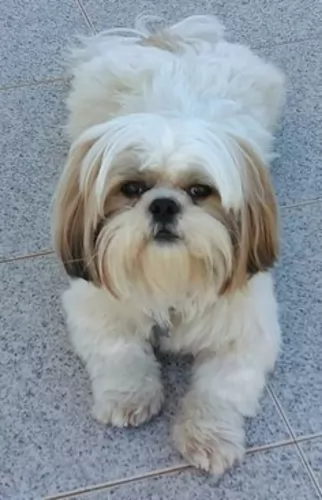 The Shih Tzu is an Imperial Chinese breed developed by palace breeders hundreds of years ago with breed stock from the Tibetan lines. It is quite probable that the Shih Tzu was originally a cross between two Sino-Tibetan ancient dogs – the Pekingese and the Lhasa Apso. Based on their looks, the Shih Tzu means the lion dog, but they were really very pampered palace dogs living with the Chinese emperors and families. The emperors were always gifting the breeders who developed the most affectionate, gentle and beautiful Shih Tzus.
The Shih Tzu is an Imperial Chinese breed developed by palace breeders hundreds of years ago with breed stock from the Tibetan lines. It is quite probable that the Shih Tzu was originally a cross between two Sino-Tibetan ancient dogs – the Pekingese and the Lhasa Apso. Based on their looks, the Shih Tzu means the lion dog, but they were really very pampered palace dogs living with the Chinese emperors and families. The emperors were always gifting the breeders who developed the most affectionate, gentle and beautiful Shih Tzus.
Until the 1930’s the Shih Tzu was not known to the world outside the emperor’s palace. Once the breed did come out from behind the palace walls, they were immediately popular. Much debate went on about how to refine the breed as clubs began to spring up in Peking and then in England. It was not until 1969 the Shih Tzu was recognized and entered in the AKC Stud Book.
While the original Shih Tzu might have been a mix between the Pekingese and the Lhasa Apso, today’s breed spread around the world after the second world war. In Europe in the 1930’s the breed was classified as Apsos. In 1935 the first Shih Tzu Club of Europe was formed, and the first standard was written, and the breed was categorized as the Shih Tzu.
Following World War II, soldiers brought the dogs to the States from Europe. By the 1950’s the breed was growing in popularity and the AKC recognized the breed in 1969 as members of the Toy Group. They are now recognized by all major kennel clubs throughout the western world. They are recognized by the Federation Cynoloqique Internationale in the Companion and Toy Group, among Tibetan breeds.
The Shih Tzu is a good watchdog, but it was bred to be a companion animal. It is a friendly, open breed that welcomes strangers. They are great with other animals and children as well as adults.
 The Central Asian Shepherd is a large dog, standing at up to 70cm in height and weighing in the region of 50kg. The dog is powerfully built and muscular, with the tail being traditionally docked to a short bob. Undocked, the tail is naturally long, thick at the base and tapering down. When relaxed, the tail is carried low, but when he becomes alert and excited, the tail is up and curved.
The Central Asian Shepherd is a large dog, standing at up to 70cm in height and weighing in the region of 50kg. The dog is powerfully built and muscular, with the tail being traditionally docked to a short bob. Undocked, the tail is naturally long, thick at the base and tapering down. When relaxed, the tail is carried low, but when he becomes alert and excited, the tail is up and curved.
The ears of this dog are also traditionally cropped close to the head so that the dog almost appears to have no visible ears. This practice is also falling away and the natural ears of this breed are small and set at- or below eye level.
The brown eyes are small to medium size and are deep set. The Central Asian Shepherd Dog is double-coated with short to medium length hair and can be found in quite a few different colors such as tan, white, black, grey, brindle, ticked or a blend of these colors.
You have to be careful about where you buy your Asian Shepherd from as these dogs can be prone to aggression. With good breeding however, the dog is evenly tempered. As a first time dog owner, this shouldn’t be your first choice as it is a dominant, wilful, territorial, independent dog who will require a tough, firm, strong owner. Training and socialization are imperative to ensure he becomes obedient. He is then capable of forming close and strong bonds with his master, becoming a loyal and devoted pet. He also makes an excellent guard dog.
He is a protective dog breed, and once trained can get on well with children and other pets. He is the kind of dog that you will want to supervise around small children.
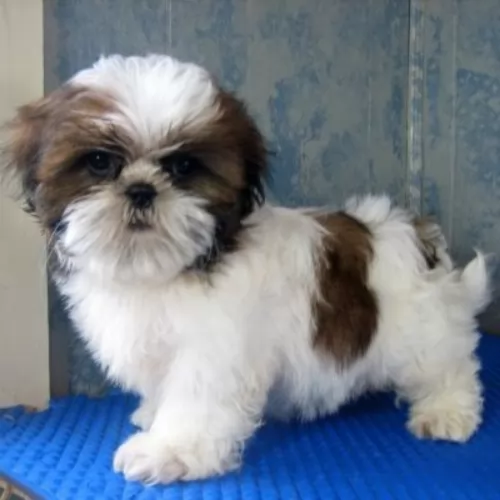 This is a breed of lively, sturdy and alert little dogs with a beautiful double coat that is flowing and long. In its full glory the Shih Tzu coat is touching the floor all the way around the dog. The dog’s bearing is as royal as its history, arrogantly carrying his head high and his tail curving over his back.
This is a breed of lively, sturdy and alert little dogs with a beautiful double coat that is flowing and long. In its full glory the Shih Tzu coat is touching the floor all the way around the dog. The dog’s bearing is as royal as its history, arrogantly carrying his head high and his tail curving over his back.
The Shih Tzu is a solid, compact breed with weight and substance. They may be a small dog, but they are a strong one. They have large dark eyes with a short muzzle and fur covered drop ears. They are just a little longer than they are tall with a distinct underbite.
There are a few differences between the European or UK Kennel Club standard and the American Kennel Club AKC standard. As opposed to the UK standard the AKC standard states that:
• The hindquarters are muscular while the front are straight. They are balanced in that they are not too long or too short.
 It is important for those interested in the Central Asian Shepherd Dog as a pet to do some research on the breed. For instance this is a large dog that has been used for fighting.
It is important for those interested in the Central Asian Shepherd Dog as a pet to do some research on the breed. For instance this is a large dog that has been used for fighting.
While he can’t be described as being overly aggressive, you do need to be aware of his history, especially when you have small children in the home.
This dog is intelligent and confident too while also being exceptionally protective, and therefore he makes a good watchdog.
It is essential to have your Central Asian trained and socialized, and then he becomes far more relaxed and obedient, making him a loyal, loving guardian and friend.
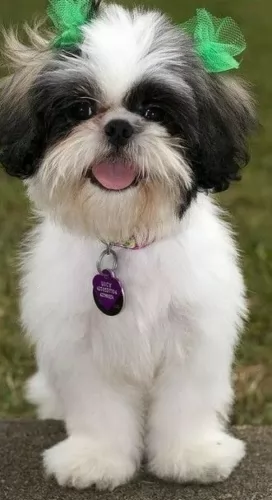 2.Special talents – they were bred to be companion animals. They are friendly and loyal.
2.Special talents – they were bred to be companion animals. They are friendly and loyal.
3.Adaptability Yes very much so. They can live in an apartment or on a farm. It doesn’t matter and they don’t need a yard.
 The Central Asian Shepherd doesn't have any hereditary ailments and he is generally a healthy, robust breed.
The Central Asian Shepherd doesn't have any hereditary ailments and he is generally a healthy, robust breed.
Large breeds are always prone to hip- and elbow dysplasia, an abnormal development of hip and elbow, brought about by a number of factors such as genetics, the wrong diet and rapid growth with some large puppies.
A dysplastic hip or elbow doesn’t move smoothly as it should, and this results in joint inflammation and pain. Symptoms can include loss of muscle mass, pain when moving around and difficulty with standing up again once your pet lies down.
 For many breeds that have the advantage of isolation like the Shih Tzu did with the emperors of China usually have very little genetic health issues. Most of the breed is indeed healthy but there are some issues.
For many breeds that have the advantage of isolation like the Shih Tzu did with the emperors of China usually have very little genetic health issues. Most of the breed is indeed healthy but there are some issues.
• Brachycephalic airway obstructive syndrome due to the shape of their face and head causes them to have breathing issues. They cannot handle heat and they cannot swim. They can have an upper airway obstruction that makes it hard for them to breath. If this is bad enough, surgery may be required.
• Hypothyroidism – thyroid does not produce the hormones necessary for metabolism to work effectively. This can lead to weight gain, hair loss, lethargy and muscle loss. It can be treated effectively.
• Issues of the eyes include – cataracts, corneal dryness and inflammation, progressive retinal atrophy, improperly closing eyelids and retinal detachment.
 Central Asians are large dogs and when he is looked after well he can reach up to 15 years of age.
Central Asians are large dogs and when he is looked after well he can reach up to 15 years of age.
It is important to see that he receives top quality, size-specific food, of which he eats a lot, and that it has all the vitamins and minerals he needs for his size.
A puppy will need high energy foods because of their energy. As he grows bigger, protein will become imperative. It is always a treat for your pet to add in some brown rice, vegetables and cooked chicken into his kibble from time to time.
Raw meat can be expensive, but if you can, it is important to ensure that your large pet gets some raw meat into his diet too, to keep his skin and coat healthy and to ward off disease. Make sure he has non-stop access to a bowl of fresh, cool water.
As previously mentioned, the coat of the Central Asian Shepherd can be fairly short but it can also be medium length. He isn't going to require any exceptional grooming but you will certainly need to give him a good brush twice a week, more so in his shedding periods. This will rid him of loose hair and keep his coat free of tangles and matting.
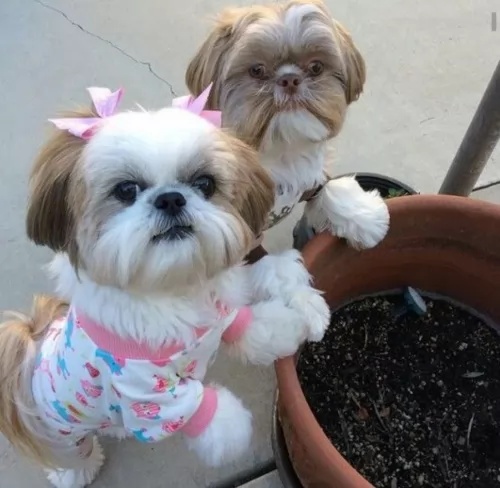 1.Feeding the puppy – this is a toy dog so don’t overfeed. They have a tendency to become obese. Calorie and weight level need to be calculated with any diet you feed. The diet should be high quality with plenty of protein made for toy dogs. Feed the puppy at least 3 times a day, maybe four in very small amounts, never more than ½ cup per day.
1.Feeding the puppy – this is a toy dog so don’t overfeed. They have a tendency to become obese. Calorie and weight level need to be calculated with any diet you feed. The diet should be high quality with plenty of protein made for toy dogs. Feed the puppy at least 3 times a day, maybe four in very small amounts, never more than ½ cup per day.
2.Feeding the adult - this is a toy dog so don’t overfeed. They have a tendency to become obese. Calorie and weight level need to be calculated with any diet you feed. The diet should be high quality with plenty of protein made for toy dogs. Feed the adult once or twice a day in larger amounts than the puppy but never more than ¾ of a cup per day.
3.Points for Good Health - most Shih Tzu’s are hardy with exceptionally good health.
This is a pampered, not high energy dog. However, she still needs playtime, which can be indoors and short walks outdoors every day.